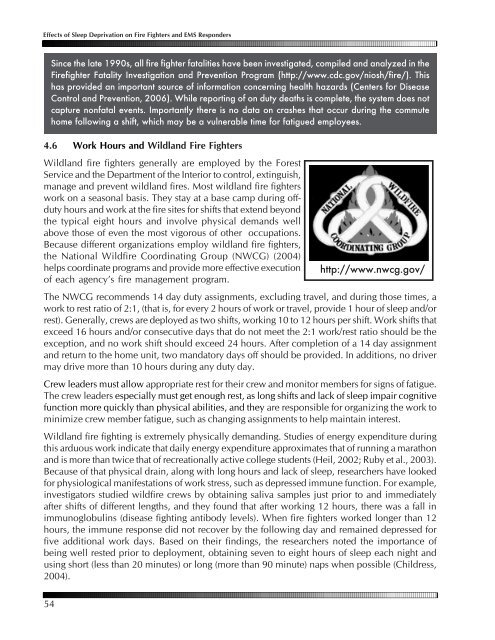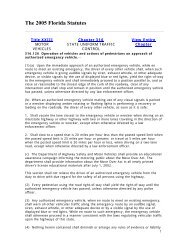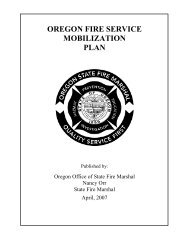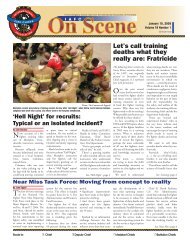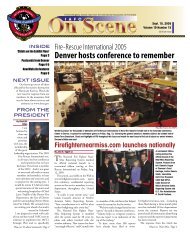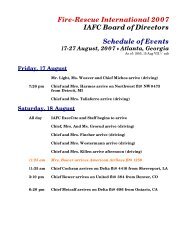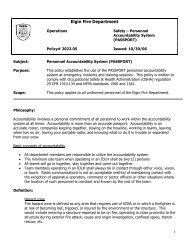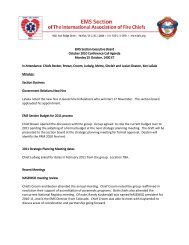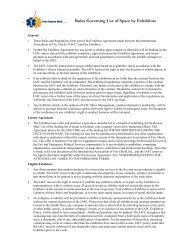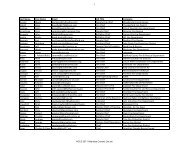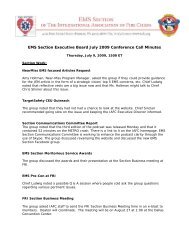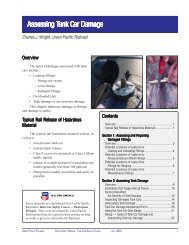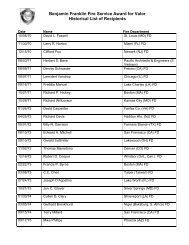Effects of Sleep Deprivation on Fire Fighters and EMS ... - NAEMT
Effects of Sleep Deprivation on Fire Fighters and EMS ... - NAEMT
Effects of Sleep Deprivation on Fire Fighters and EMS ... - NAEMT
Create successful ePaper yourself
Turn your PDF publications into a flip-book with our unique Google optimized e-Paper software.
<str<strong>on</strong>g>Effects</str<strong>on</strong>g> <str<strong>on</strong>g>of</str<strong>on</strong>g> <str<strong>on</strong>g>Sleep</str<strong>on</strong>g> <str<strong>on</strong>g>Deprivati<strong>on</strong></str<strong>on</strong>g> <strong>on</strong> <strong>Fire</strong> <strong>Fighters</strong> <strong>and</strong> <strong>EMS</strong> Resp<strong>on</strong>ders<br />
Since the late 1990s, all fire fighter fatalities have been investigated, compiled <strong>and</strong> analyzed in the<br />
<strong>Fire</strong>fighter Fatality Investigati<strong>on</strong> <strong>and</strong> Preventi<strong>on</strong> Program (http://www.cdc.gov/niosh/fire/). This<br />
has provided an important source <str<strong>on</strong>g>of</str<strong>on</strong>g> informati<strong>on</strong> c<strong>on</strong>cerning health hazards (Centers for Disease<br />
C<strong>on</strong>trol <strong>and</strong> Preventi<strong>on</strong>, 2006). While reporting <str<strong>on</strong>g>of</str<strong>on</strong>g> <strong>on</strong> duty deaths is complete, the system does not<br />
capture n<strong>on</strong>fatal events. Importantly there is no data <strong>on</strong> crashes that occur during the commute<br />
home following a shift, which may be a vulnerable time for fatigued employees.<br />
4.6 Work Hours <strong>and</strong> Wildl<strong>and</strong> <strong>Fire</strong> <strong>Fighters</strong><br />
Wildl<strong>and</strong> fire fighters generally are employed by the Forest<br />
Service <strong>and</strong> the Department <str<strong>on</strong>g>of</str<strong>on</strong>g> the Interior to c<strong>on</strong>trol, extinguish,<br />
manage <strong>and</strong> prevent wildl<strong>and</strong> fires. Most wildl<strong>and</strong> fire fighters<br />
work <strong>on</strong> a seas<strong>on</strong>al basis. They stay at a base camp during <str<strong>on</strong>g>of</str<strong>on</strong>g>fduty<br />
hours <strong>and</strong> work at the fire sites for shifts that extend bey<strong>on</strong>d<br />
the typical eight hours <strong>and</strong> involve physical dem<strong>and</strong>s well<br />
above those <str<strong>on</strong>g>of</str<strong>on</strong>g> even the most vigorous <str<strong>on</strong>g>of</str<strong>on</strong>g> other occupati<strong>on</strong>s.<br />
Because different organizati<strong>on</strong>s employ wildl<strong>and</strong> fire fighters,<br />
the Nati<strong>on</strong>al Wildfire Coordinating Group (NWCG) (2004)<br />
helps coordinate programs <strong>and</strong> provide more effective executi<strong>on</strong><br />
<str<strong>on</strong>g>of</str<strong>on</strong>g> each agency’s fire management program.<br />
http://www.nwcg.gov/<br />
The NWCG recommends 14 day duty assignments, excluding travel, <strong>and</strong> during those times, a<br />
work to rest ratio <str<strong>on</strong>g>of</str<strong>on</strong>g> 2:1, (that is, for every 2 hours <str<strong>on</strong>g>of</str<strong>on</strong>g> work or travel, provide 1 hour <str<strong>on</strong>g>of</str<strong>on</strong>g> sleep <strong>and</strong>/or<br />
rest). Generally, crews are deployed as two shifts, working 10 to 12 hours per shift. Work shifts that<br />
exceed 16 hours <strong>and</strong>/or c<strong>on</strong>secutive days that do not meet the 2:1 work/rest ratio should be the<br />
excepti<strong>on</strong>, <strong>and</strong> no work shift should exceed 24 hours. After completi<strong>on</strong> <str<strong>on</strong>g>of</str<strong>on</strong>g> a 14 day assignment<br />
<strong>and</strong> return to the home unit, two m<strong>and</strong>atory days <str<strong>on</strong>g>of</str<strong>on</strong>g>f should be provided. In additi<strong>on</strong>s, no driver<br />
may drive more than 10 hours during any duty day.<br />
Crew leaders must allow appropriate rest for their crew <strong>and</strong> m<strong>on</strong>itor members for signs <str<strong>on</strong>g>of</str<strong>on</strong>g> fatigue.<br />
The crew leaders especially must get enough rest, as l<strong>on</strong>g shifts <strong>and</strong> lack <str<strong>on</strong>g>of</str<strong>on</strong>g> sleep impair cognitive<br />
functi<strong>on</strong> more quickly than physical abilities, <strong>and</strong> they are resp<strong>on</strong>sible for organizing the work to<br />
minimize crew member fatigue, such as changing assignments to help maintain interest.<br />
Wildl<strong>and</strong> fire fighting is extremely physically dem<strong>and</strong>ing. Studies <str<strong>on</strong>g>of</str<strong>on</strong>g> energy expenditure during<br />
this arduous work indicate that daily energy expenditure approximates that <str<strong>on</strong>g>of</str<strong>on</strong>g> running a marath<strong>on</strong><br />
<strong>and</strong> is more than twice that <str<strong>on</strong>g>of</str<strong>on</strong>g> recreati<strong>on</strong>ally active college students (Heil, 2002; Ruby et al., 2003).<br />
Because <str<strong>on</strong>g>of</str<strong>on</strong>g> that physical drain, al<strong>on</strong>g with l<strong>on</strong>g hours <strong>and</strong> lack <str<strong>on</strong>g>of</str<strong>on</strong>g> sleep, researchers have looked<br />
for physiological manifestati<strong>on</strong>s <str<strong>on</strong>g>of</str<strong>on</strong>g> work stress, such as depressed immune functi<strong>on</strong>. For example,<br />
investigators studied wildfire crews by obtaining saliva samples just prior to <strong>and</strong> immediately<br />
after shifts <str<strong>on</strong>g>of</str<strong>on</strong>g> different lengths, <strong>and</strong> they found that after working 12 hours, there was a fall in<br />
immunoglobulins (disease fighting antibody levels). When fire fighters worked l<strong>on</strong>ger than 12<br />
hours, the immune resp<strong>on</strong>se did not recover by the following day <strong>and</strong> remained depressed for<br />
five additi<strong>on</strong>al work days. Based <strong>on</strong> their findings, the researchers noted the importance <str<strong>on</strong>g>of</str<strong>on</strong>g><br />
being well rested prior to deployment, obtaining seven to eight hours <str<strong>on</strong>g>of</str<strong>on</strong>g> sleep each night <strong>and</strong><br />
using short (less than 20 minutes) or l<strong>on</strong>g (more than 90 minute) naps when possible (Childress,<br />
2004).<br />
54


